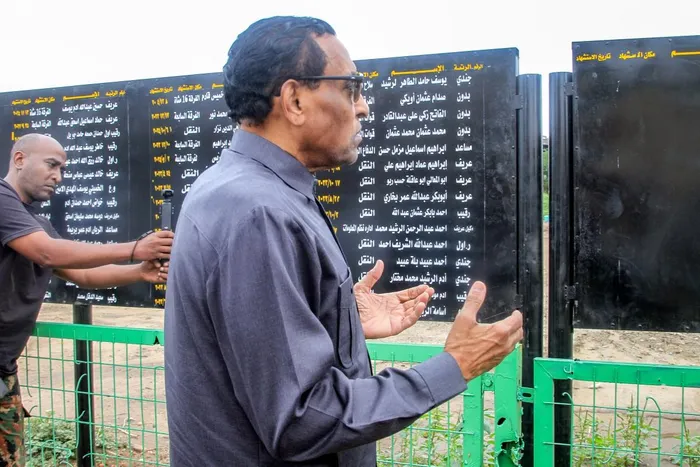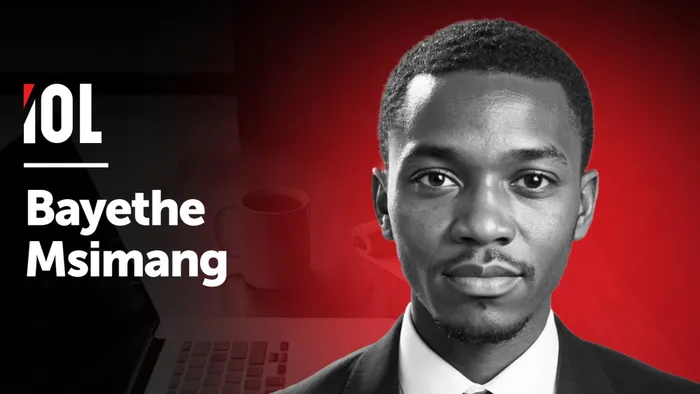
Sudan's Prime Minister Kamil Idris recites a prayer before a memorial listing the names of soldiers killed in the war between the army and the Rapid Support Forces (RSF) paramilitaries, at the army's General Command Headquarters cemetery in Khartoum on August 27, 2025.
Image: Ebrahim Hamid / AFP
After more than two years of war that exhausted the nation and plunged it into crises of hunger, displacement, and disease, Sudan now stands at a decisive moment that could reshape its modern history.
The announcement of the “Ta’sis” government and the inauguration of the new Sovereign Council represent not merely a change of faces in power, but a serious attempt to redefine the Sudanese state and free it from the grip of extremist groups and political Islam that have shackled the country for decades.
The figures are staggering: over 25 million Sudanese face food insecurity, including nearly 700,000 experiencing “catastrophic hunger”. Millions more have been forcibly displaced, making Sudan’s displacement crisis the largest in African history. Hospitals lie in ruins, epidemics spread unchecked, and Khartoum itself has transformed into a ghost city, a far cry from its former status as the political and economic heart of the country.
Amid this collapse, extremists and Islamists have exploited the chaos to entrench their presence through shadowy political and security networks, attempting to recycle their old influence, often leveraging the army and its commander, Abdel Fattah al-Burhan, who pursues power with relentless determination. Yet the emergence of the “Ta’sis” government is presented as a historic opportunity to dismantle this system and block the return of the “Empowerment” forces that left a nation in ruins.
Lieutenant General Mohamed Hamdan Dagalo (“Hemedti”) emphasized upon taking the oath that the Sudanese people are the source of legitimacy and that the new government will implement the 2025 constitution, establishing decentralized governance that allows each region to manage its resources justly. His message was clear: there will be no return to rule by a narrow elite or a centralized state that marginalized communities for decades.
Deputy Chair of the Sovereign Council, Abdelaziz Adam Al-Hilu, noted that the first meeting set out a strategic roadmap prioritizing the humanitarian agenda and improving citizens’ lives, while moving beyond ideological agendas that have historically obstructed state-building.
Tahir Abkar Ahimer, spokesperson for the Sudanese Democratic Liberation Movement, hailed the government as the first since independence to provide genuine representation for all components of Sudanese society, from north to south and east to west. He described it as a milestone “inscribed in letters of light,” reflecting a unifying national project beyond the divisive “Islamists versus secularists” paradigm that tore the country apart.
Sudanese writer Mousa Al-Amin Hamouda went further, asserting that the “Ta’sis” government is not merely a transitional authority but a project to redefine the state itself, establishing a new social contract that ends the dominance of extremist and exclusionary currents and lays the foundation for equal citizenship and indivisible justice.
The government’s unspoken mandate appears to be the liberation of Sudan from the grip of political Islamist groups that ruled under various banners for decades and built parallel economic and security networks.
These groups were the primary beneficiaries of chaos, consistently obstructing any genuine transition to a civilian democratic state.
The hope now rests on the new council, which, backed by popular support and an openness to the international community, can weaken these currents through policies that:
Despite enormous challenges - including displacement, famine, arms smuggling, and regional interventions - the moment of foundation may mark the beginning of the end for the “ideological overreach” state that has dominated Sudan since the 1989 coup.
It is an opportunity to return power to the people, to build a modern civil state with equal rights, and to remove extremists from political and economic decision-making.
As Sudanese look to the future with a mixture of anxiety and hope, the “Ta’sis” government faces a critical test: either it proves capable of freeing the country from the grip of political Islam, or it becomes yet another chapter in the long saga of maneuvers and delays the nation has endured for decades.

After years of turmoil, Sudan's 'Ta'sis' government emerges as a potential catalyst for change, aiming to redefine the nation and liberate it from extremist influences. Will this new leadership succeed in overcoming the unprecedented humanitarian crisis?
Image: IOL
* Bayethe Msimang is an independent writer, commentator and analyst.
** The views expressed do not necessarily reflect the views of IOL or Independent Media.
Related Topics: